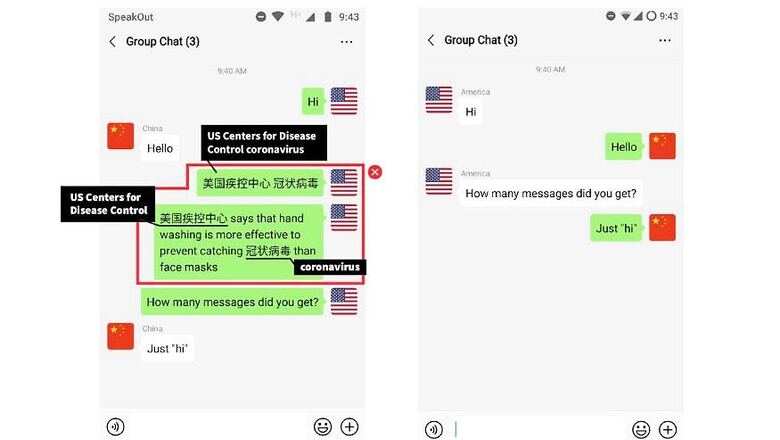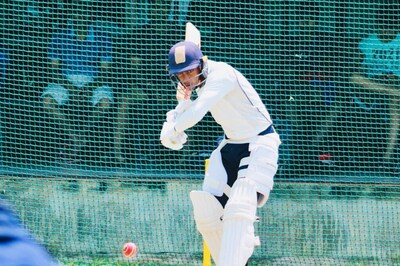
views
China’s most popular instant messaging app WeChat is apparently on a censorship overdrive by blocking out keywords related to the Coronavirus. This revelation comes from the research group Citizen Lab, which tested this using three WeChat accounts. WeChat is owned by Tencent and has over 1.5 billion active users globally. In China, WeChat is popular because the app offers a range of additional features, including digital payments, voice messaging, games, health data tracking and more. The researchers suggest that WeChat is censoring certain keywords server-side, which simply put, they are checking the content of messages being sent on a remote server and filtering messages that contain these keywords.
The research suggests that WeChat is censoring messages based on whether it contains a blacklisted keyword combination or not. The important bit here is the condition of a keyword combination, because it consists of one or more keywords. For instance, a keyword component appears in a message, even if it is a single component, then the message is filtered. The Citizen Lab researchers use the example of a message which reads “习近平到武汉,” “Xi Jinping goes to Wuhan”) and say the message is filtered if it contains that component. For any keyword combination that contains more than one component, a message is censored of that combination appears anywhere in that message.
The researchers tested this by using three WeChat accounts—one registered to a mainland Chinese phone number and two registered to Canadian phone numbers. They state that these accounts and the group created to include these three accounts were only for interacting with each other and at no point did they use these for messaging anyone else on the platform. “Between January 1 and February 15, 2020, we found 516 keyword combinations directly related to COVID-19 that were censored in our scripted WeChat group chat. The scope of keyword censorship on WeChat expanded in February 2020. Between January 1 and 31, 2020, 132 keyword combinations were found censored in WeChat. Three hundred and eight-four new keywords were identified in a two-week testing window between February 1 and 15,” the researchers say.
"Between January 1 and February 15, 2020, we found 516 keyword combinations directly related to COVID-19 that were censored in our scripted WeChat group chat. The scope of keyword censorship on WeChat expanded in February 2020" - Citizen Lab research
The study indicates that the keyword combinations include text in simplified and traditional Chinese. For the latter, the researchers translated each keyword combination into English to understand the meaning and context. It turns out that the Coronavirus and COVID-19-related keyword combinations that are being censored cover a wide range of topics. These include “discussions of central leaders’ responses to the outbreak, critical and neutral references to government policies on handling the epidemic, responses to the outbreak in Hong Kong, Taiwan, and Macau, speculative and factual information on the disease, references to Dr. Li Wenliang, and collective action.” They also discovered that references to President Xi Jinping as well as other central government and Party leaders including Premier Li Keqiang, Vice Premier Sun Chunlan, and the Politburo Standing Committee of the Communist Party of China as a collective agency are high on censorship priority.
“When a message is sent from one WeChat user to another, it passes through a server managed by Tencent (WeChat’s parent company) that detects if the message includes blacklisted keywords before a message is sent to the recipient. Documenting censorship on a system with a server-side implementation requires devising a sample of keywords to test, running those keywords through the app, and recording the results,” say the researchers.
At the time of writing this, there are more than 93,000 confirmed cases of Coronavirus around the world, with as many as 124 cases already confirmed in the US. China continues to be the worst hit with 80,270 cases in Mainland China, 100 in Hong Kong and 10 reported from Macau, according to official figures.
Earlier this week, the new cyberspace regulations went Live in China as it continues to battle the Coronavirus, or COVID-19 outbreak. Among the long list of do’s and don’ts released by the Cyberspace Administration of China in the Regulations on the Ecological Governance of Network Information Content, one guideline that truly stands out is the one that reads “spreading rumors and disturbing the economic and social order” under Article 6 which headlines Producers of online information content may not produce, copy or publish illegal information containing the following contents”.
The Citizen Lab is based at the Munk School of Global Affairs & Public Policy, University of Toronto.




















Comments
0 comment